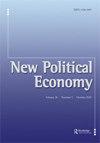Inclusion or co-optation? Navigating recruitment as a gender diversity candidate in finance
IF 3.8
2区 经济学
Q1 ECONOMICS
引用次数: 0
Abstract
ABSTRACT In the decade-plus following the financial crisis of 2008, diversity and inclusion initiatives – especially those targeting gender – have proliferated in global financial centres. Feminist political economists critique the ways that struggles for gender and racial equality can become co-opted via inclusion endeavours, and how they may primarily serve to legitimate existing institutional practices. At the same time, diversity and inclusion initiatives open up counterspace for emerging professionals to draw from experiences of marginalisation, formulate critiques, and push back against processes that generate inequalities. In this study, I draw from field-based and interview research on gender diversity programmes in finance to analyse how dynamics of co-optation and critique play out as recent initiates into the industry navigate diversity offerings. I refer to De Jong and Kimm’s (2017) research agenda on co-optation as conceptual reference, demonstrating how mechanisms, effects, and actor’s perceptions of co-optation play out together in this particular institutional matrix. The fault lines that emerge around institutional practices of diversity indicate where a hegemonic incorporation that would serve the financial establishment is incomplete and contestations over the inclusivity of professions, markets and financialised societies remain.包容还是增选?作为金融行业性别多元化候选人的招聘指南
在2008年金融危机之后的十多年里,多样性和包容性倡议——尤其是针对性别的倡议——在全球金融中心激增。女权主义政治经济学家批评了争取性别和种族平等的斗争可能通过包容性努力被同化的方式,以及它们可能主要是如何使现有的制度实践合法化的。与此同时,多样性和包容性倡议为新兴专业人士提供了反击空间,使他们能够从边缘化的经验中汲取教训,提出批评意见,并抵制产生不平等的进程。在这项研究中,我借鉴了金融领域性别多样性项目的实地研究和访谈研究,以分析在新近进入该行业的新人驾驭多样性产品时,合作和批评的动态是如何发挥作用的。我引用De Jong和Kimm(2017)关于合作的研究议程作为概念参考,展示了合作的机制、效果和行动者的感知如何在这个特定的制度矩阵中共同发挥作用。围绕机构多样性实践出现的断层线表明,在哪些地方,为金融机构服务的霸权合并是不完整的,而关于职业、市场和金融化社会的包容性的争论仍然存在。
本文章由计算机程序翻译,如有差异,请以英文原文为准。
求助全文
约1分钟内获得全文
求助全文
来源期刊

New Political Economy
Multiple-
CiteScore
10.10
自引率
9.50%
发文量
41
期刊介绍:
New Political Economy aims to create a forum for work which combines the breadth of vision which characterised the classical political economy of the nineteenth century with the analytical advances of twentieth century social science. It seeks to represent the terrain of political economy scholarship across different disciplines, emphasising original and innovative work which explores new approaches and methodologies, and addresses core debates and issues of historical and contemporary relevance.
 求助内容:
求助内容: 应助结果提醒方式:
应助结果提醒方式:


